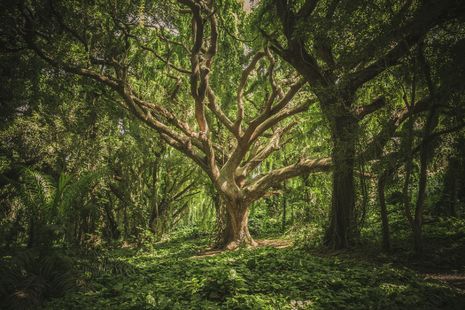Loving nature may be part of your DNA
Ben White summarises a study suggesting that genetics can explain one’s enjoyment and perception of nature

A recent study led by Dr Chia-Chen Chang at the National University of Singapore has found that a person’s perception and appreciation of nature is partially explained by genetics.
Dr Chang and her team surveyed 1,153 pairs of twins in the UK about their "nature orientation" - their perceptions of, familiarity with, and desire to be among nature. The team also investigated the twins’ "nature experiences", including how often they were able access natural places, such as public green spaces and gardens, and for how long they did so.
By comparing monozygotic (identical) twins who share almost 100% of their DNA with dizygotic (non-identical twins) who only share 50% but likely have similar upbringings, the team found that identical twins were much more likely to have similar nature orientations than non-identical twins, suggesting that up to 46% of an individual’s nature orientation may be heritable.
Moreover, by assessing how often and for how long they visited public green spaces and gardens, the team found that identical twins were also more likely to have similar nature experiences than non-identical twins. This lends more support to the idea that a person’s willingness to access natural spaces may, in part, be heritable.
“Particularly in urban environments, people’s access to nature is far from equal”
To separate any effects of genetics from shared environmental influences like upbringing, twin studies are often used when studying the genetic influences of human behaviour. Using pairs of twins from the TwinsUK registry, Dr Chang and her team aimed to identify the effects of genetics on people’s orientations and experiences of nature.
In their study, the researchers also looked at traits such as age; with ages of participants ranging from 19 to 89 (with an average of 60), the team found that any heritable effects on orientation and experience tend to decrease as people get older. They claim this may be due to cumulative effects of environmental factors as we age, such as different life experiences, economic situations, and health constraints. For example, people with mobility issues may be less able to access natural spaces.
“The team found that up to 46% of an individual’s nature preferences may be heritable”
In addition to a moderate genetic influence, Dr Chang’s team also reported that more than half of individual variation could be explained by variations in environmental factors such as urbanisation. By looking at their postcodes, the researchers were able to assess how urbanised the areas the twins lived in were. They reported that people in urban environments had fewer nature experiences than those living in rural areas.
Urbanisation may also skew people’s nature orientations. To use an example local to Cambridge, field spaces such as Jesus Green or Parker’s Piece may seem to be highly natural to someone who is used to living in an inner-city area, but may appear less so to someone who grew up with access to more biodiverse environments such as woodlands. Despite this, the team suggested that more "nature-oriented" people might still seek out natural spaces irrespective of how urbanised their homes may be. They also suggested that nature-oriented people may simply gain more benefits by being in natural spaces than those who aren’t.
Importantly, the team highlighted that, particularly in urban environments, people’s ability to access nature is far from equal. Prior studies in the UK have shown that socioeconomic status is a big factor when determining access to nature, with poorer people having less access to green spaces – something that became abundantly clear during COVID lockdowns, as many people in urban environments did not have the luxury of private transport to visit natural sites. This is a societal issue that will need to be addressed if we are to have equal access to nature, especially as we become an increasingly urbanised population.
Taken together, despite the large influence of environmental factors, Dr Chang and her team provide early evidence that the way we interact with the natural world may be partly influenced by our genes. In other words, human nature dictated by the laws of nature.
 News / Cambridge academics sign open letter criticising research funding changes22 February 2026
News / Cambridge academics sign open letter criticising research funding changes22 February 2026 News / Supporters protest potential vet school closure22 February 2026
News / Supporters protest potential vet school closure22 February 2026 News / University Council rescinds University Centre membership20 February 2026
News / University Council rescinds University Centre membership20 February 2026 News / Hundreds of Cambridge academics demand vote on fate of vet course20 February 2026
News / Hundreds of Cambridge academics demand vote on fate of vet course20 February 2026 News / Union cancels event with Sri Lankan politician after Tamil societies express ‘profound outrage’20 February 2026
News / Union cancels event with Sri Lankan politician after Tamil societies express ‘profound outrage’20 February 2026










